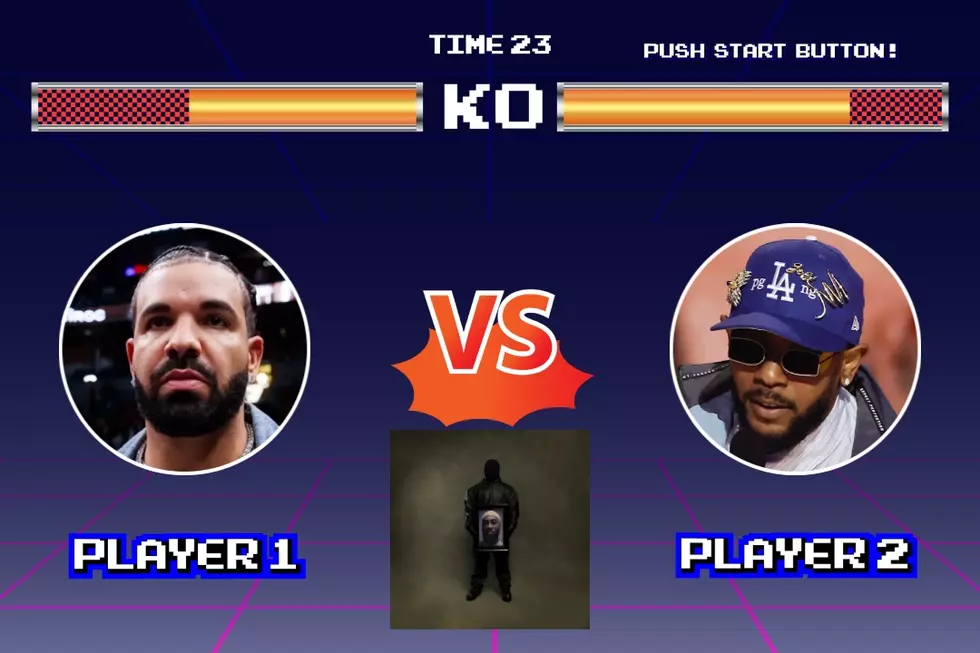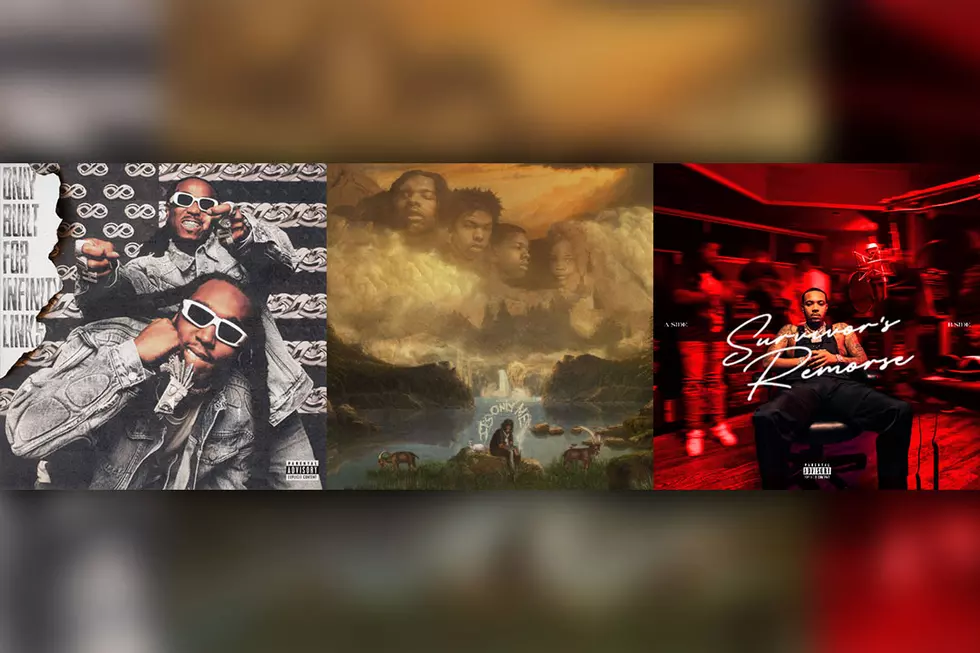
Cormega And Large Professor Want To Champion The Essence Of Hip-Hop
New York-born and bred MC Cormega is pacing around backstage of the Knitting Factory in Brooklyn anxiously staring at his phone. On Monday night (July 21), he’s here to perform his new album, Mega Philosophy, in its entirety, and he’s expecting a lot of longtime friends, family members and fellow MCs to show up in support.
“I got so many people coming,” he quickly tells me before answering a call. “It’s gonna be some shit.”
He answers the phone to yell at a friend named Fatboy, who can’t seem to find the venue. Dressed in an old-school bucket hat and a green-jeweled necklace that Sun Ra would wear, Mega embraces the disorder of the night with a smile. Meanwhile, the other star of the show, legendary producer Large Professor, who produced the entirety of Philosophy, isn’t talking to anyone. He quickly walks in and out of the backstage room, barely acknowledging me, to grab some slices of greasy cheese pizza. Curiously, he only takes one at a time (he’s up to three at this point). Mega’s manager informs me that Large Pro hasn’t had much of an interest in talking to the media ever since a journalist got hold of one of his albums at a listening party in the 2000s and leaked it. Luckily, I stumble upon him in another room, sitting alone on a cruddy Ikea couch, which serves as our icebreaker.
Despite their different personalities, Mega and LP seem to be in similar places in life. Both are revered figures in hip-hop, known for being experts in their respective crafts of rhyme spitting and beat making. Both have also somehow fallen into the state of being perpetually “underrated”—a term that Mega only now is able to swallow without any resentment. But the biggest bonding factor between the two is the fact that they both believe something is missing from the hip-hop culture. Of course, this is not a new sentiment; many veteran MCs and producers have said the same thing in years past. It comes off a little different, though, when you’re dealing with two musicians who’ve contributed to some of the genre’s greatest records of all time.
“We’re sticking to the roots of what we do,” Large Professor says.
That goal can be heard plainly on Philosophy, a vintage East Coast hip-hop album built on lyrical dexterity and sample-based beats for the tape deck of a chromed-out boombox. XXL talked further with both guys to learn about how the project was made and their history together. Queens is in the house.—Reed Jackson
XXL: You both grew up in Queens, but actually didn’t work together until the early 2000s. How long have you two known each other?
Cormega: Very long. I knew people that was very close to him in proximity for forever.
Large Professor: Yeah, I met him a long time ago. Nas was telling me, “Yo, this is my man and he’s nice with it.” And I was just like, “Aight, cool. We gonna work one day.” And then, you know, he went through some difficulties in life where he got locked up and everything. But once he touched back down, I seen him again and it was just like, “Yo, come on, let’s go.”
Who approached who about doing a full record together?
C: [We first worked together]g on The True Meaning, and it was an honor. And then we did something for Legal Hustle, the compilation I made, but he didn’t produce he just rapped on it, and that was fun. And then we did “Journey,” and that’s the one that opened the fucking door to doing a whole album, because the feedback we got on that was phenomenal.
LP: Just out of nowhere he was like, “Yo, you know what? Let’s just start the album.” It’s cool [to produce an entire record] because it’s like a brotherhood almost. It’s just like putting out to the world like, “Yo these guys really rock like that.” It’s not just a one off where some dudes have questionable chemistry. It’s like, “Yo these dudes really rock. They go on the road together and really do this.”
Mega, you said you wanted this album to completely come out of left-field and be unexpected. What was the creative process like behind it for you two?
C: We all get predictable sometimes, and I wanted to show real artistry and take creative risk and just do different shit with this album. I think I did it with the song “More;” I think I did it with “Industry.” “Rise” is a song I also think people wouldn’t expect from me, so there’s definitely some songs on it they wouldn’t expect.
LP: The approach on this was different because Mega actually had a lot to do with the production. I was kind of giving him basic ideas; that’s how I start anyway. I start to format it a certain way and then as we start to build it I add on to it. The process was definitely outside of anything I’ve ever done before. I’m pretty much always [in control]. Mega got a few of the sounds, like on the “Industry” song with the Lauryn Hill ad-lib. Mega put a lot into that kind of stuff.
C: It’s a challenge [to work with one producer for a whole album]. But, it’s Large Professor; he’s one of the greatest producers that’s ever existed. It’s not debatable. So when you get an opportunity with someone like that, you do it. He was gonna make me do things different than how I would normally do it. But I was welcome to the challenge, and I’m glad I did it.
Why should people pay attention to this record? In your eyes, why is it significant?
C: The culture needs it now more than ever because you got a lot of clowning going on, and you got a lot of grown men perpetuating childish behavior and it’s too much ignorance going on. I just wanted to be real serious with my approach on this album. The culture needs championing. People are trying to phase out lyricism and the real shit, and I just wanted to stand up.
LP: The foundation of [the culture] is being a little overshadowed right now by what’s popular, which is cool, but I always equate it to how when you go to Italy, pizza is revered. It’s like certain things are staples in certain cultures. You go to New Orleans and you hear the music there—you don’t let go of that. That’s what you go to New Orleans for. With New York hip-hop being overshadowed, it’s just like this is crazy. When you listen to the radio, the majority of everything is different. We’re just putting that out to the people to let them know that everybody is not swaying. Everyone is not trying to do trap music; we’re sticking to the roots of what we do.
C: I got some remixes coming. We got one with the juice crew—me Craig G, Masta Ace and Kool G Rap. And then I got one with me, Lord Jamar, Sadat X, Roc Marciano and Inspectah Deck. Two remixes to “Industry.”
What’s your reaction to young New York MCs who make trap music and say, “This is the New York sound. This is who we are.”
LP: It’s cool, and I embrace it. But it would be an edge to them to know the origin of it and be able to speak that language also, as well as what they’re doing now. We understand the beats are different and they bang differently. But you should always be able to speak this language because this is to your benefit to be able to do this. There’s definitely no hate involved, it’s just the lack of understanding on their part is [confusing]. When we were coming up, we embraced Grandmaster Flash and all of those dudes that we considered old school at that time.
C: There’s an old saying that goes, “It’s not what you say but how you say it,” so the way I say [that New York is missing something] I try not to sound preachy on it. I also have street cred with these young dudes. They know my credibility in the street is authentic; it’s not something it’s marketed or I try to exploit in my music. It’s something that’s real and genuine. So if I tell them to do it this way, they tend to listen more because they know I’ve been through it. When I made songs like “Industry,” I didn’t even think people would like it, to be honest with you. But then the feedback I got on it was so overwhelming that it surprised me. I’ll just continue to try to make music like I do, and it’s a goal of mine not to sound preachy.
Are there any young New York MCs right now you two are feeling?
C: New York has no identity. If you close your eyes and listen to the radio station in New York, you would think you was down south. And then they have playlists, so that means they’re not giving the local talent or new artists a shot. You’re strangling the growth of the culture. [But] I’m feeling Chris Rivers. The last time I performed here, I let Chris Rivers perform. I also had him on my best-of mixtape, so I always try to show love to new artists that I feel are striving and that I think are dope.
LP: I like the World’s Fair crew. There’s a guy named Ryan Perfect that’s dope. Starvin' B’s dope. I like the guys that can spit. They may not be popular, but they can definitely hold it down.
Mega, you’re kind of in a unique situation in that you’ve been in the game a long time, but it wasn’t that long ago that you dropped your first record. Do you view yourself as a veteran or still a dude making a name for himself?
C: I’m still hungry. I just recently got the chip off my shoulder. For years and years, my name was synonymous with “underrated.” I like being the underdog; I don’t mind that. But it got to the point where the world was sleeping on me. When I started getting my recognition from people I was influenced by, it took some of the burden off my shoulder. I’m getting respect from Chuck D. Rakim let me rap at one of his shows, and he was ad-libbing to my vocals. Guru said I was his favorite rapper. So just getting this kind of love is like, “Wow.” Even [younger] dudes like Lil B were like, “Mega is my favorite rapper.” I could go on for days. Stuff like that makes me think that people do appreciate what I do, and I don’t have to have the chip on my shoulder all the time. But I’m still hungry, and I’m still trying to be a champion for our culture.
I noticed Nature is on the record, who Mega had some beef with back in the day. You probably get this all the time, but I’ve got to ask: Is everything cool with you and Nas now?
C: It’s not really something I think about anymore. He has ears. When he brought me out in the Nokia Theater, that fucking crowd erupted. Look up that footage, don’t even take my word for it. After that, it was common sense that people wanted us to do music, but we’ve never done music. It’s not my fault. I’m not gonna be one of those artists that’s stagnating waiting for something.
If you notice, none of the singles I put out [for Philosophy] really had features on them. “Industry” was me by myself. “Rap Basquiat” was me, by myself. I don’t depend on nobody; I just do what I do.
What about the ghost writing rumors—are they true?
C: I don’t want to talk about that because that’s not gonna benefit me at all. I will say that I ghostwrote for three prolific…people. But it’s nothing I want to bask in. Everyone I ever ghostwrote for could stand on their two feet anyway. Some people I might have just written a chorus, and some people I might have just written a verse. I definitely done that but the names shall remain nameless. When you’re fucking with people, it’s about the camaraderie. You want to help your people shine, and it is what it is. It’s frustrating when you write something for someone and that shit blows up and you find out about royalties, because I think, “Man, I could have been paid!” But everything I went through I have no regrets. Everything I went through made me who I am now.
More From XXL









